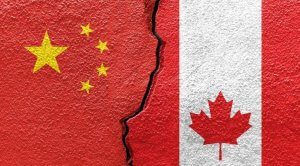 The PRC will likely consolidate and step up its successful illicit technology acquisition programs to meet its needs, write Henry Geraedts and Shuvaloy Majumdar.
The PRC will likely consolidate and step up its successful illicit technology acquisition programs to meet its needs, write Henry Geraedts and Shuvaloy Majumdar.
By Henry Geraedts and Shuvaloy Majumdar, November 10, 2020
International dynamics are increasingly marked by political and economic decoupling, certainly where the People’s Republic of China (PRC) is concerned. There is therefore a clear requirement for refocused realism in Canada’s international relations, particularly salient in terms of safeguarding Canada’s technology and intellectual property (IP) infrastructure from foreign interests.
The PRC’s predatory interest in Canadian technology and intellectual property is longstanding and well-documented. Besides access to commodities and providing a backdoor to the United States, Canada represents a valuable source of technology and IP. The PRC’s engagement with Canada has not been for the sake of cultural harmony or the spirit of ideological kinship once espoused by Messrs. Bethune or Trudeau Sr., but rather is driven by hardnosed Chinese Communist Party (CCP) interests.
What is required today is a fundamental reassessment of Canada’s relations with the PRC, enabling government and parliamentary leaders to redefine key trade, finance, energy and technology policies, based not on short-term thinking but on hard facts and cool-headed analysis.
Three fundamentals should inform how we approach this challenge.
First, the US is not our adversary. Washington is by far our most important trading partner and a sine qua non ally and protector in a rapidly evolving world order. The PRC, however, has for decades been particularly adept at exploiting sentiments in Canada that see the country as morally superior to the US.
Second, all levels of government must internalize that today’s global centre of gravity is in the Indo-Pacific. Canada’s roots have traditionally been largely Atlanticist, but our 21st century interests lie in successfully managing complex relationships with key actors across the Indo-Pacific.
And third, our refocus must pivot on a broad reassessment of the PRC as a long-term political, economic and values-based rival.
Canadian policy-makers must accept that China has institutionalized an integrated system of legal and illegal means of acquiring technology and data across the world. In that context, the PRC has for decades successfully advanced its objectives through broadly-based United Front Work Department operations in academia, business and the civil service, including with the specific objective of accessing Canadian research and development, key technologies, and intellectual property.
There are several steps that the Canadian government can take to safeguard Canadian research, technology and IP:
- Extend collaboration with key partners such as Five Eyes, NATO and the G7, and bilaterally with important allies such as Japan, India and Israel, to stymie the PRC’s illicit technology acquisition programs.
- Domestically, enact a broadly anchored legislative framework to blunt the PRC’s economic and cyber espionage against Canadian interests by its state and CCP entities, state-owned enterprises, universities and individuals. This would include passing legislation that provides CSIS, the RCMP and the Department of Justice with effective and actionable means to confront the PRC’s technology espionage and “sharp power” operations, in order to enable consequential prosecution and effective counter-measures.
- Establish a powerful watchdog agency modelled on the one established by the Australian government, to counter various forms of PRC influence and coercion activities.
- Implement closer scrutiny and vetting of the roughly 130,000 Chinese foreign students attending Canadian universities. Canadian governments at every level should be focused on responding to the 2014 PRC legislation, requiring all Chinese citizens to cooperate with China’s intelligence services, and the incontrovertible implications of that legislation. Of note, the PRC does not recognize dual citizenship or attendant renunciation of Chinese citizenship. To the CCP, a Chinese national who has become a Canadian citizen remains Chinese. This mindset explains Ambassador Cong Peiwu’s recent threat against 300,000 Canadians of Hong Kong origin.
- Implement no-fly lists and impose travel bans on known or suspected actors involved in cyber espionage or influence campaigns, and reconsider residence and property rights for high-level CCP members and affiliates such as Meng Wanzhou and fellow travellers.
- Urgently put in place a mandatory in-depth program to inform and engage universities, research councils, and civil society on the extent and methods employed by the PRC to gain access to Canadian technologies, know-how and IP.
- Immediately put in place restrictions on Canadian universities and research institutes against working with and sharing data with known or suspected actors. This includes prohibiting faculty at a Canadian institution from holding multiple academic/research positions involving PRC institutions.
At the recent Fifth Plenum, the CCP codified Xi Jinping’s 2035 “dual circulation strategy,” representing officially a switch from an export-driven economy to reliance on China’s vast domestic market. This constitutes a seismic political shift aimed at self-sufficiency in key areas of dependency such as food production, energy and technology – in effect, formalizing the CCP’s decision to decouple unilaterally.
Reality is that over the past three decades the PRC has repeatedly failed to establish critical technology ecosystems based on commercially acquired technologies, while many its achievements have instead been based on technologies obtained illicitly. It would therefore be surprising indeed if the the PRC doesn’t further consolidate and step up its successful illicit technology acquisition programs to meet its needs. Canadian leaders must guard our technology and innovators from this intensifying threat.
Henry Geraedts holds a PhD in International Political Economy and is a long time China observer. He is an Adjunct Professor with the Johnson Shoyama Graduate School of Public Policy at the University of Saskatchewan. Shuvaloy Majumdar is Program Director and Munk Senior Fellow for Foreign Policy at the Macdonald-Laurier Institute.




